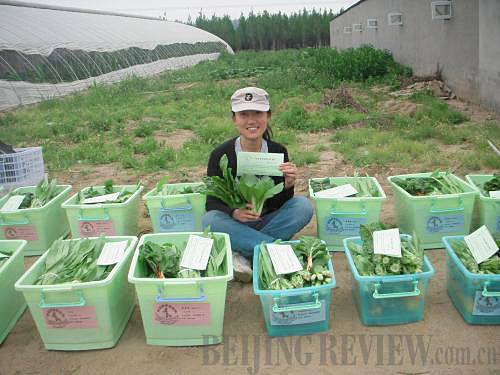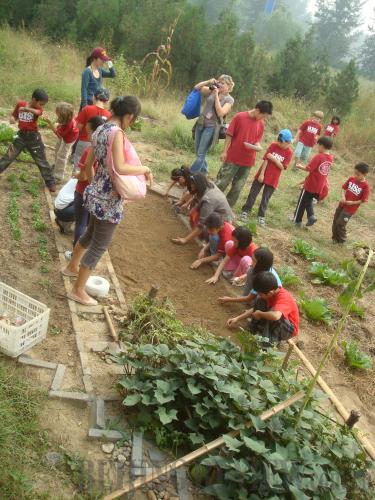|
 |
|
READY TO GO: Shi Yan with produce to be delivered to customers (COURTESY OF LITTLE DONKEY FARM) |
On a cold winter morning, Yin Ruiqing, a retired worker in Beijing, was busy harvesting carrots and Chinese cabbages on a 30-square-meter piece of rented land in near suburb. Later, he plowed the land carefully for the next sowing.
Yin's adventures in farming began one day when he saw a newspaper advertisement for a farm, called "Little Donkey Farm." The farm, located in a suburban area in the north of the city, offers people a chance to grow their own organic vegetables.
"I was so excited at the news. I wanted to grow my own vegetables so much!" said Yin, who rented a 30-square-meter plot of land for a year for 1,200 yuan ($180).
In the past year, Yin has spent many happy moments at his vegetable garden. He usually goes twice a week to sow, water, weed and harvest.
"I feel excited every time I come to my plot of land," said Yin. "Farming gives me joy I can't find among fancy city buildings." Under the instruction of farm staff, he now grows more than 30 different kinds of vegetables, according to the different seasons.
Gaining popularity
The Little Donkey Farm opened to the public in March 2009. The farm practices community supported agriculture (CSA), a new form of agriculture that aims to draw agricultural producers and consumers closer together.
 |
|
FARMING EXPERIENCE: Students from an international school farm in a small plot of land at the Little Donkey Farm (COURTESY OF LITTLE DONKEY FARM) |
CSA began in the early 1960s in Germany, Switzerland, and Japan as a response to concerns about food safety and the urbanization of agricultural land. CSA generally focuses on the production of high quality foods for a local community, often using organic farming methods.
The Little Donkey Farm has grown quickly since it was founded by Shi Yan, a PhD graduate in the School of Agricultural Economics and Rural Development at Renmin University of China in Beijing.
Shi got the idea for the farm in 2008 during a period of research and internship at a CSA farm in Minnesota, the United States, while working on her PhD. After graduation and armed with what she had learned in the United States, Shi started her own farm.
The Little Donkey Farm's customers comprise two groups. "Common buyers" have organically grown vegetables delivered to their houses every weekend. The other group is "self-farming customers," who cultivate vegetables or other crops on 30 square meters of rented land. Both types of customers sign contracts with the farm and pay certain costs up front. "Common buyers" can opt to buy produce during the spring season (May-November), the winter season (December-April), or both.
After just two years, the Little Donkey Farm has grown a lot. Shi said the farm's "common buyers" increased from 40 in 2009 to 280 spring buyers and 270 winter buyers in 2010. People who farmed rented plots increased from 20 in 2009 to 120 the next year.
Profound changes
CSA represents a major departure from traditional agriculture, in which individual farmers often face huge risks related to crop failure and pricing, among other things. CSA reduces this risk by using a membership system. Through membership payments, consumers financially support the operation of the farm. In return, every week members receive an allotment of seasonally ripe produce. This approach minimizes financial risks for the producer, saves time and allows producers to focus on organic farming.
| 